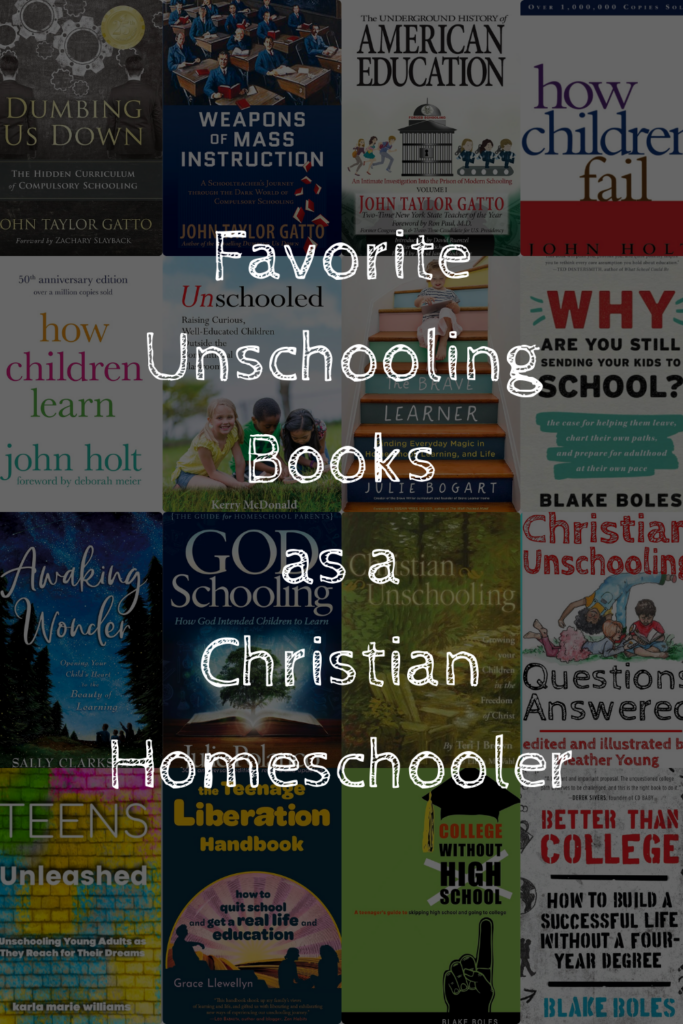Favorite Unschooling Books as a Christian Homeschooler
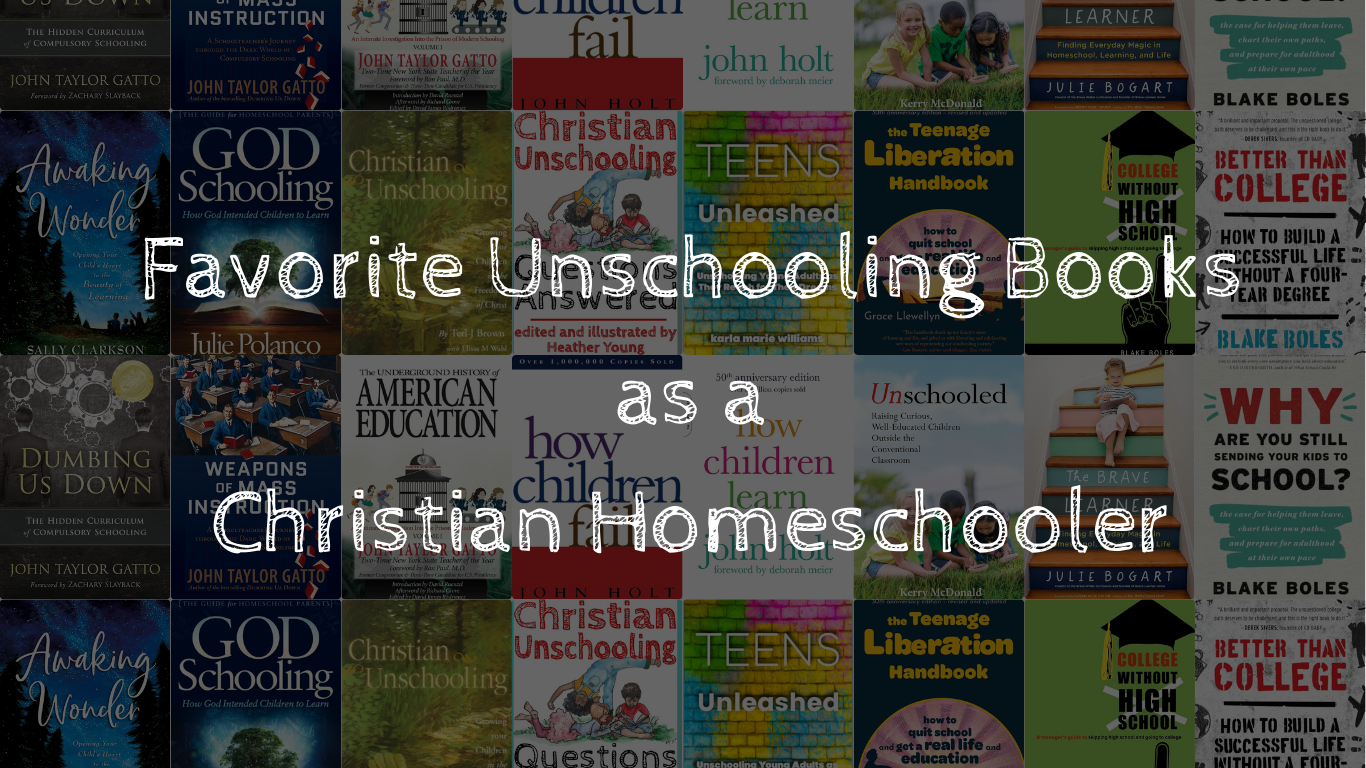
Books to Read for Reframing Your Thinking About Education
This post contains affiliate links and we may earn compensation when you click on the links, at no additional cost to you.
Dumbing Us Down: The Hidden Curriculum of Compulsory Schooling by John Taylor Gatto critiques the traditional public school system, arguing that it suppresses creativity, critical thinking, and individuality. Drawing from his experience as a public school teacher, Gatto highlights the “hidden curriculum” of schooling, which teaches conformity, dependence on authority, and a fragmented sense of knowledge.
He contends that the factory-model education system prioritizes obedience over true learning, discouraging self-reliance and curiosity. Instead, Gatto advocates for alternative approaches to education, including homeschooling and self-directed learning, to foster independent thinkers equipped to thrive in life beyond school.
Such an eye-opening book that ANY parent should read!
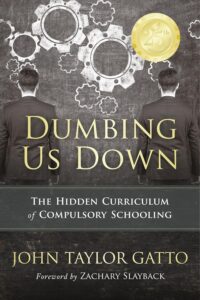
Weapons of Mass Instruction: A Schoolteacher’s Journey Through the Dark World of Compulsory Schooling also by John Taylor Gatto. This read continues to critique the compulsory schooling system but how it differs from his first book (Dumbing as Down), which lays out his general case against conventional schooling, this book further argues that schools have been created deliberately as a tool of social control, designed to produce obedient, manageable workers and consumers rather than free, self-reliant individuals.
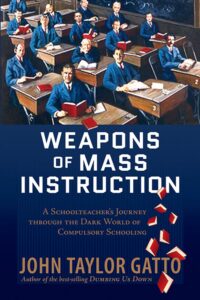
The Underground History of American Education: An Intimate Investigation Into the Prison of Modern Schooling also by John Taylo Gatto. If you can’t get enough of his work between Dumbing Us Down and Weapons of Mass Instruction, this book really dives deep as it investigates the origins and hidden agendas of the modern education system. And despite having history in the title, it isn’t really a history book, as it is – according to Gatto – “a collection of materials towards a history, embedded in a personal essay analyzing why mass compulsion schooling is unreformable.”
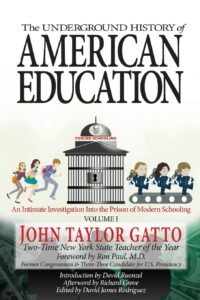
How Children Fail by John Holt (another public school educator turned homeschool/unschool advocate) examines why traditional education systems often fail to help children learn effectively. Through his observations as a teacher, Holt identifies fear, pressure, and rigid structures as key factors that undermine children’s natural curiosity and ability to think critically.
Holt argues that the focus on grades, tests, and rote memorization creates a culture of anxiety and conformity, leading children to prioritize pleasing adults over genuine understanding. He advocates for a shift toward trusting children’s innate learning abilities and creating environments that foster curiosity, creativity, and meaningful engagement with the world.
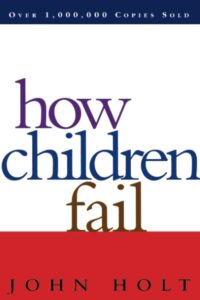
Why Are You Still Sending Your Kids to School?: The Case for Helping Them Leave, Chart Their Own Paths, and Prepare for Adulthood at Their Own by Blake Boles is a well-researched, yet conversational read that challenges the idea that every single student should be in school. I appreciate that he doesn’t necessarily talk down about traditional schooling, acknowledges that some people thrive in a school system setting (like I did, believe it or not!), and even brings up the idea that not everyone has the means or privilege to be able to homeschool.
He advocates more for self-directed learning (not necessarily homeschooling) and addresses the concerns many parents have about allowing their children to take ownership of their own education, particularly questions about what happens after the high school years (i.e. can self-directed learners go to college and how?). If you are needing reassurance for embarking on an unschooling path, this is a must-read!

Books to Read About How to Unschool in General
How Children Learn by John Holt is the companion book to How Children Fail. While his other book explains the problem with the public school system, this one explores the natural ways children acquire knowledge when they are free to follow their interests. Through keen observation, Holt highlights how curiosity, play, and exploration drive learning, as children experiment, ask questions, and make sense of the world around them.
He contrasts this with the restrictive nature of traditional schooling, which often stifles creativity and curiosity. Holt advocates for a supportive, trusting environment where children can learn at their own pace, guided by their intrinsic motivation, rather than external pressure or rewards.
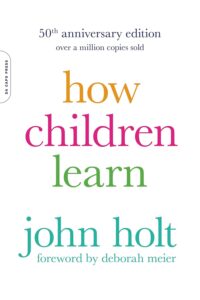
Unschooled: Raising Curious, Well-Educated Children Outside the Conventional Classroom by Kerry McDonald (an education policy writer with a master’s degree from Harvard) advocates for self-directed education as an empowering alternative to traditional schooling.
Like John Holt’s How Children Learn, McDonald explores how children thrive when given the freedom to learn through curiosity, play, and real-life experiences, rather than rigid curriculums and standardized testing. However, the difference between the two books is that while Holt’s has more philosophical depth, offering observational insights from his perspective as an educator into how children acquire knowledge naturally, McDonald’s offers more practical application, demonstrating how unschooling works in real-life contexts and how parents can implement it effectively (she is also a parent whose kids never went to school, while Holt did not have any children).
Therefore, if I only had to pick one book over the other as a mama needing actionable guidance, I would go with this one.
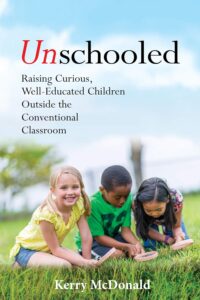
The Brave Learner: Finding Everyday Magic in Homeschool, Learning, and Life by Julie Bogart isn’t necessarily an unschooling book but I include it here because it give actionable ideas for how to create an enchanted learning environment for your children that fosters genuine love for learning.
Reading this book will inspire you to create joyful, curiosity-driven learning environments at home using strategies for making learning meaningful and magical. I especially loved the section for us parents titled, Awesome Adulting, where she reminds us that we model what pursuing learning and growth to our children, and gives us inspiring ideas to lead the way for them.

Books to Read About How to Unschool as Christians
Awaking Wonder: Opening Your Child’s Heart to the Beauty of Learning by Sally Clarkson also is not an a dedicated unschooling book, but I include it because of the heart behind it, which is in alignment with natural learning.
In the book, parents are encouraged to cultivate a love for learning by nurturing their children’s curiosity, imagination, and faith. Clarkson shares her experiences as a homeschooling mother, offering practical wisdom and biblical insights for creating a life-giving home environment where education is a natural and joyful part of daily life.
The book emphasizes the importance of relationships, discipleship, and inspiring children to see God’s hand in the world around them. And we, as parents, are invited to awaken wonder in our children by modeling a vibrant love for God, learning, and life.
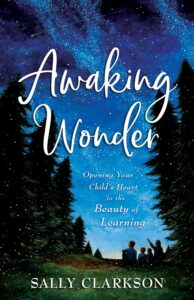
God Schooling: How God Intended Children to Learn by Julie Polanco explores a faith-based approach to education, emphasizing that God designed children to learn naturally through curiosity, relationships, and real-life experiences. Polanco critiques traditional schooling methods and offers biblical insights into how parents can nurture their children’s unique gifts and talents through a Spirit-led, individualized approach to learning.
The book encourages parents to trust God’s guidance in their homeschooling journey, highlighting the importance of discipleship, flexibility, and creating an environment that fosters both spiritual and academic growth.
This is probably my favorite book that combines the heart of unschooling with how that aligns with our faith as Christians.
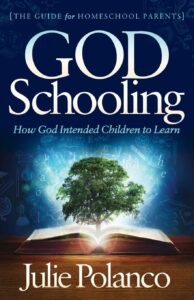
Christian Unschooling: Growing Your Children in the Freedom of Christ by Teri Brown and Elisa Wahl presents unschooling as a Christ-centered approach to education, emphasizing trust in God’s design for learning and each child’s unique journey. The authors explore how faith and unschooling align, showing how children can thrive academically, spiritually, and emotionally when given the freedom to learn naturally.
Through personal stories and practical insights from other Christian unschoolers, the book challenges traditional schooling paradigms, encouraging parents to embrace grace-filled discipleship and create an environment where learning flows from a deep relationship with God and each other.
It also is very practical, offering chapters on how to get started, what a day can look like, ideas for language arts, history, math, and science, and record-keeping.
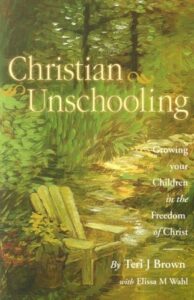
Christian Unschooling: Questions Answered by Heather Young is more of a guide that Christian unschooling parents can refer to. It’s packed with genuine, real-world answers to hard questions, that were compiled over the years from veteran homeschoolers. It also makes the distinction between unschooling and radical unschooling (which isn’t biblical).
Young covers topics such as how to trust God’s plan for each child’s learning journey, how to incorporate faith into everyday learning, and how to overcome fears about stepping away from traditional education methods. The book encourages parents to embrace the flexibility of unschooling, trusting in God’s guidance and their children’s God-given potential.
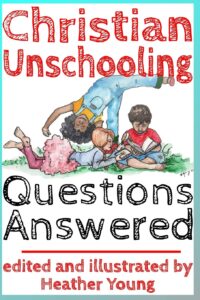
Books to Read for Unschooling Younger Kids
Talkers, Watcher, Doers: Unlocking Your Child’s Unique Learning Style by Cheri Fuller was one of the more impactful homeschooling books I read when first embarking on our homeschool journey. This isn’t a book just for unschoolers, but for any home educator or parent who wants to understand how to help their child best learn and succeed. But if you are an unschooler, this is especially helpful as you curate a meaningful education geared towards your unique child.
Fuller explores the different ways children learn based on their personality and preferences and categorizes children into three main types: talkers (who learn best through discussion and verbal expression), watchers (who learn by observing and need visual stimuli), and doers (who thrive through hands-on activities and movement).
The book offers practical strategies for parents to recognize and nurture their child’s unique learning style, fostering a more effective and engaging educational environment. This book was SO helpful for me as a new homeschool mama and being able to understand how each of my kiddos learn best!
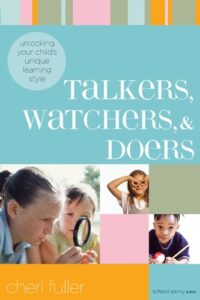
Want to know what unschooling preschool looked like in our home? Head to this blog post.
I also have blog posts sharing how we unschooled certain subjects in the elementary years:
Books to Read for Unschooling Older Kids
Teens Unleashed: Unschooling Young Adults as They Reach for Their Dreams by Karla Marie Williams offers practical advice for parents seeking to support and empower their teenagers in a world full of challenges. Williams provides insights into understanding the emotional, mental, and spiritual needs of teens, while also addressing the struggles they face during this developmental stage.
She also includes practical wisdom for implementing the natural learning style in these teen years, plus shares how her family keeps records and makes transcripts.
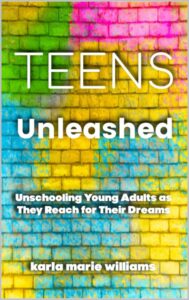
The Teenage Liberation Handbook: How to Quit School and Get a Real Life and Education by Grace Llewellyn is designed to be read by your teen and is a comprehensive guide tackling everything an unschooling student needs to know about taking ownership of their education outside of school.
Since this is a secular unschooling book, my one caution is to be mindful of advice that isn’t in line with biblical principles. Otherwise, this was a very helpful resource for actionable ideas my teens could do for their self-directed education.
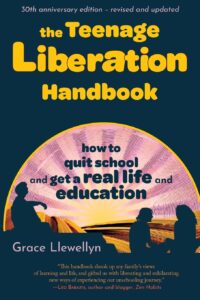
College Without High School: A Teenager’s Guide to Skipping High School and Going to College is another great read by Blake Boles.
This guide is for teens and parents exploring alternative paths to higher education without following the traditional high school route. Boles, again, advocates for self-directed learning, encouraging teens to design their own educational journeys based on their passions and interests. The book outlines how to build a strong, unconventional academic portfolio through independent projects, experiential learning, and real-world accomplishments that can impress colleges. With practical advice and inspirational examples, he demonstrates that skipping high school doesn’t mean missing out on success – it can lead to a more engaging, personalized, and fulfilling educational experience.
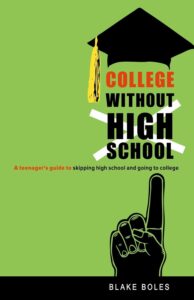
Better Than College: How to Build a Successful Life Without a Four-Year Degree by Blake Boles bypasses the idea of college altogether! This was such a helpful and reassuring read for me as well as for each of my older teens (who aren’t college-bound).
This is a super compelling guide for young adults considering alternatives to traditional higher education and it challenges the necessity of a college degree, especially for those driven by curiosity, creativity, and entrepreneurial ambitions. Boles offers practical advice on how to design a self-directed education, build a network, gain real-world experience, and achieve personal and professional goals without attending college. Through inspirational examples and actionable steps, the book empowers adolescents to take charge of their learning journey and create a meaningful, fulfilling life outside the conventional academic system.
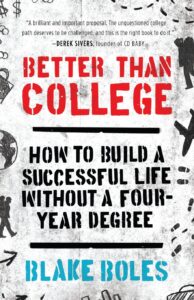
The teen years are especially daunting for homeschoolers. Many end up putting their kids back in school because they feel ill-equipped. Or they subject their kiddos to more rigor with all kinds of curricula in order to “prepare them” for college or success.
But unschooling high school has been some of the most formative years for our own kiddos, who we continue to empower in leading their own educational journey. They were trained at a young age how to create vision for themselves and how to create and tackle learning objectives intentionally. One of the strategies we use in our own self-directed homeschool is The North Star Strategy, which you can read more about in this blog post. 🙂
